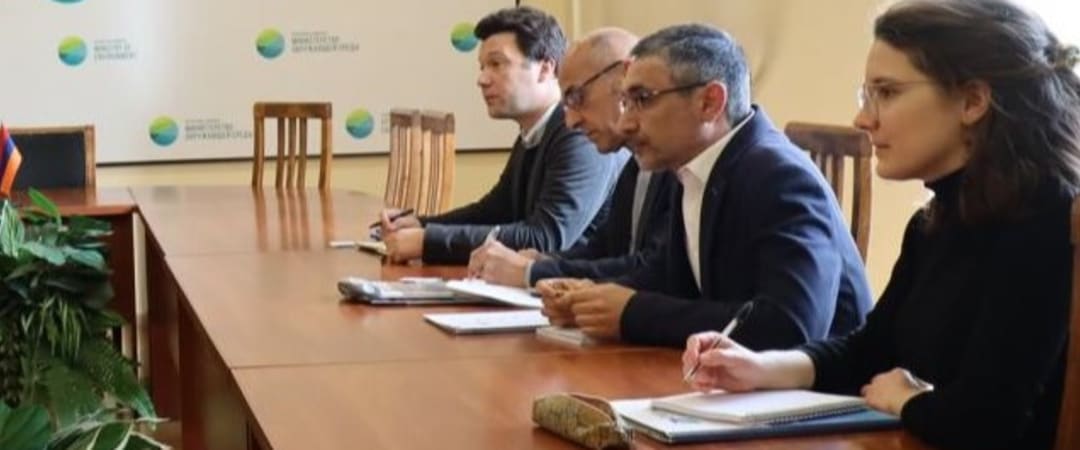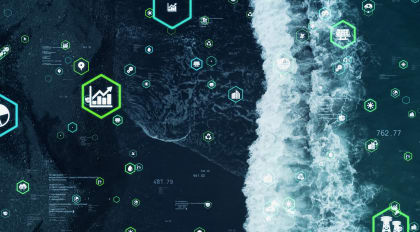Interview with Chloé Déchelette, European Project Communications Officer at OiEau

Since 2019, Chloé Déchelette has been in charge of the communication of European projects within the Institutional and Technical Cooperation Department.
What are your tasks at OiEau?
At OiEau, I am in charge of communication, mainly for two projects financed by the European Union (UE).
One of the projects, EU4Environment, aims at approximating the practices of the Eastern Partnership (EaP) countries with those of the EU in the management of water resources and environmental data(on water, air, waste and land use). The EU EaP countries are Ukraine, Moldova, and the three Caucasus countries: Armenia, Azerbaijan and Georgia.
The other project, CARIBSAN, has a more specific objective: to develop planted filters for sanitationin the Caribbean. For this project, we are working with Cuba, Dominica, Guadeloupe, Martinique and Saint Lucia.
My job is to establish strategies and communication plans, manage budgets and monitor the implementation of actions. For implementation, we may have to recruit service providers in the countries, or we may do it from France in coordination with the teams on the ground. In general, for communication, everyone pitches in.
What was your background before OiEau?
I studied political science at the Institut d'Études Politiques de Bordeaux. I graduated with a Master's degree in International Relations in partnership with the Russian University of Peoples' Friendship in Moscow, where I did my last year of the Bachelor's degree and 2nd year of the Master's degree. I did a two-month internship in a consultancy firm in Lyon that assisted local authorities in the transfer of "water and sanitation" competences. I really enjoyed this internship, but unfortunately, I had difficulties to find an internship in a similar field in Moscow. So I decided to study for another year at the Champollion University in Albi, to obtain a Master 2 on Environmental Management at the territorial level. There, I learned a lot thanks to the group work, to the other students who came from very different backgrounds, and to the visits to the actors of the territory. This second year of the Master's programme also allowed me to do a long internship at OiEau and to get my first job.
What are the most important challenges you face in your job?
I would say that the main challenge is to get everyone to agree to speak with one voice. This is not always easy, as the partners in a project all have their own interests, agendas and messages to get across. The aim is to keep the main thing in mind: we are all here to find ways to live better with nature. We need to find a story that we can tell together, a story that also has enough power to make things happen, even in a small way.
The project with the EaP countries obviously has strategic implications for the EU. Communication must be done in close cooperation with the European Commission, the EU delegations and the countries' environment ministries. Both geopolitical and environmental issues must be taken into account.
For the second project, the communication is more technical, we are getting to the heart of the matter by trying to explain the functioning of planted filters to those who will have to build and operate them. We also try to convince people of the advantages of planted filters to improve sanitation in these countries.
What is the achievement you are most proud of?
I really enjoyed conducting a workshop with the Caribbean partners to establish the communication plan. We had to run it in three languages simultaneouslyand make sure that all the partners got involved, gave their ideas and proposed ways to implement them.
I also work with illustrators, and more often with photographers and video artists. I'm very interested in this: how we can talk about nature and water in a less 'expert' language, by appealing to the senses and emotions. When you manage to establish a good relationship with a team of videographers, when you trust them and when the team in turn invests in the project, then very often the result exceeds expectations. You think you've succeeded in telling a story that everyone can relate to and that makes you want to listen to it. But the recipe is far from being successful every time!
How do your assignments fit in with your values?
I really enjoy working on international water management projects. What I like most is being able to communicate with water stakeholders from different countries. You learn about the way we, as French or European citizens, 'manage' our water resources, but also about our perceptions of nature.
Working internationally also makes me ask questions. Especially when all around me, I see examples of a return to the local level, to scales of action that have less negative impact on the natural environment. Even if technology allows us to work better and better at a distance, we can't totally do without flying to meet partners. Talking face-to-face has much more impact and avoids many misunderstandings and wasted time. I still believe that international cooperation is essential, especially today and especially for the environment. I think that we will manage to find more and more ways of implementing it in a more sober way and that it remains consistent with the objective of protecting the environment.
De quelle manière tes missions se concilient avec tes valeurs ?
Travailler pour des projets de gestion de l’eau à l’international me plaît énormément. Ce qui me plaît le plus c’est de pouvoir communiquer justement avec les acteur·rice·s de l’eau de différents pays. On apprend sur la manière dont nous-mêmes, en tant que Français·e·s ou Européen·n·e·s, nous « gérons » nos ressources en eau, mais aussi sur nos perceptions de la nature.
Le travail à l’international m’amène aussi à me poser des questions. Surtout quand partout autour de moi, je vois des exemples de retour au local, à des échelles d’action qui ont moins d’impacts négatifs sur les milieux naturels. Même si la technologie permet de travailler de mieux en mieux à distance, on ne peut pas totalement se passer de prendre l’avion pour rencontrer les partenaires. Parler en face-à-face a bien plus d’impact, cela permet d’éviter beaucoup de malentendus et de perte de temps. Je continue à croire que la coopération internationale est essentielle, surtout aujourd’hui et surtout pour l’environnement. Je pense qu’on arrivera à trouver de plus en plus de moyens pour que sa mise en œuvre soit plus sobre et qu’elle reste cohérente avec l’objectif de protection de l’environnement.




